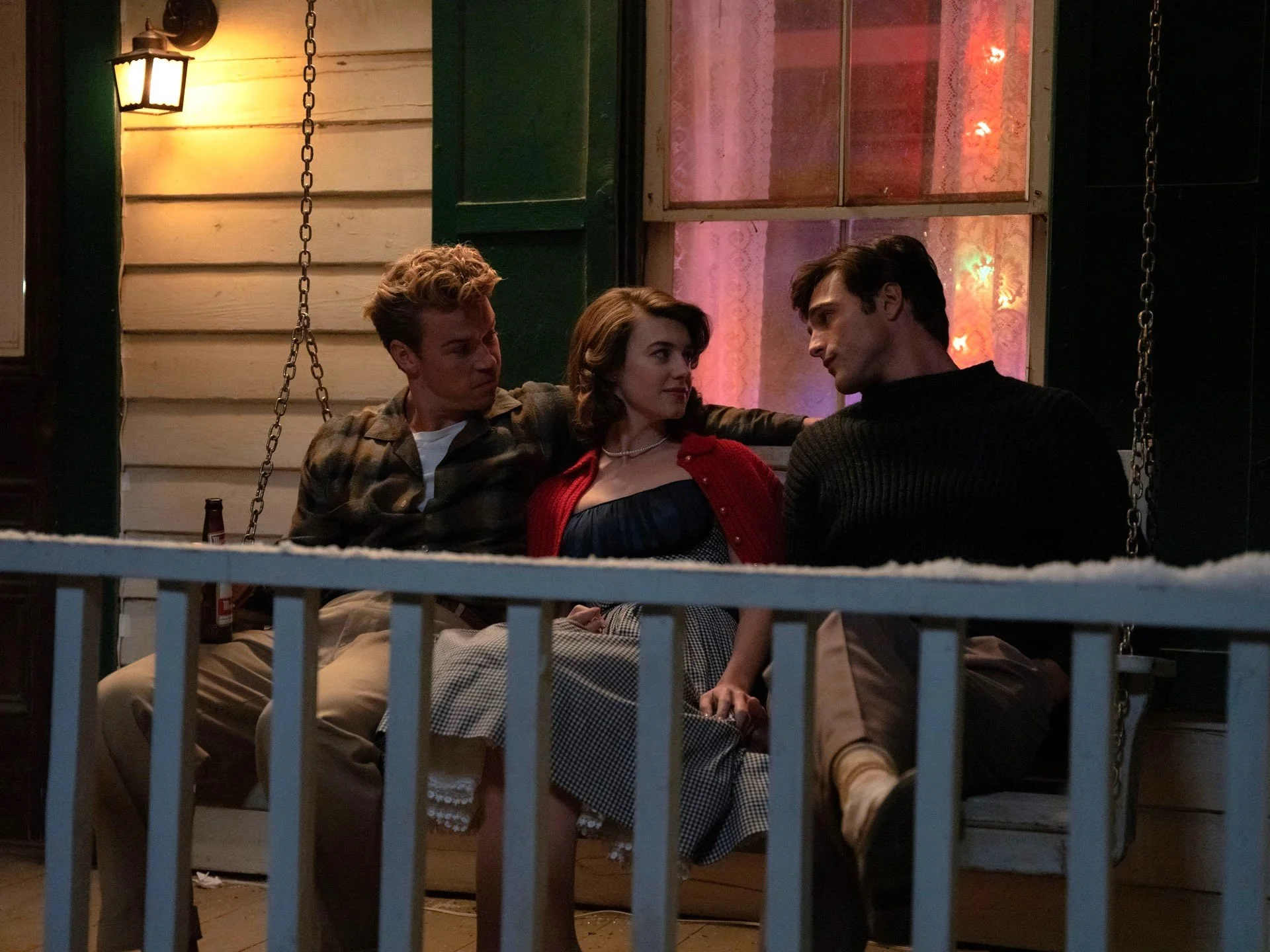On Swift Horses: Queer Love Between a Man and Woman in the Not-So-Fabulous 1950s
By Liam Lacey
Rating: B+
A visually luscious period drama, On Swift Horses explores the vulnerable queer subcultures of Eisenhower-era America through the bond between Muriel (Daisy Edgar-Jones), a young housewife and waitress, and her rootless brother-in-law Julius (Jacob Elordi).
Adapted from Shannon Pufahl’s lyrical 2019 novel, the film is a working-class companion to Todd Haynes’ two fifties-era queer dramas, Far From Heaven (2002) and Carol (2012). Scripted by Bryce Kass (the 2018 lesbian-themed true crime drama, Lizzy), the film is the directorial debut of Daniel Minahan, who has worked extensively in prestige small screen series and, years ago, co-wrote Mary Harron’s I Shot Andy Warhol.
Canadian cinematographer Luc Montpellier (Women Talking, The Saddest Music in the World) draws our attention to a spectrum of vibrant surfaces: A stark monochromatic Kansas snowstorm, the neon hallucination of 1950s Las Vegas, the sun-bleached tract homes of suburban San Diego, and the gaudy shabbiness of a Tijuana street.
The emphasis on the film’s look extends through every aspect of the production: The racing yacht-shaped cars, the men’s aerodynamic hairdos, and gym-chiselled physiques worthy of modern underwear ads.
Australian actor Elordi — who played Elvis Presley in Priscilla, a preppie in Saltburn, and a younger version of Richard Gere in Oh, Canada — seems to be cornering the sexually ambiguous, hot indie guy film market.
Edgar-Jones, meanwhile — best known for her terrific work as the bright misfit Irish school girl in the TV adaption of Sally Rooney’s Normal People — has a more internalized performance, while consistently looking as chic as Audrey Hepburn at a photoshoot. (This is something of a contrast to Muriel in the novel, with her tomboy haircut and “wide shoulders and square waist.”)
On Swift Horses is best admired as a visual tone poem to the era, not so much a realistic story. The conceit of casting characters who seem too splendid for their surroundings evokes the movie melodramas of the fifties, the time of Elizabeth Taylor and Montgomery Clift.
It is also a reminder of the movies’ mixed gender signals, when so many of the heartthrob masculine icons of the era were subsequently revealed to be privately gay or bisexual.
The loosely episodic story, connecting the dreamy images, follows a trail of romantic encounters, disappointments, and unfinished business. Muriel marries the well-meaning but clueless Lee, an ex-soldier. But Muriel feels a much stronger erotic spark for his younger brother Julius, who shamelessly flirts with her, though we sense he may be trying too hard.
When Julius leaves for extended periods, they pine for each other and share long-distance confidences, but it turns out what they shared was recognition of their common dilemma more than mutual attraction.
Soon, they each turn to same-sex lovers. While working at a casino in Vegas, Julius is seduced by his Mexican American co-worker Henry (Diego Calva). In her new suburban home, Muriel skips work to canoodle with a lesbian neighbour Sandra (Sasha Calle), who physically suggests a shorter, female version of Julius.
As the film rolls toward its conclusion, Julius and Muriel separate and drift, and the film loses touch with its central tension, which is the couple’s impossible bond. Throughout, the film layers in unsubtle metaphors about risk and freedom. Julius is a gambler at cards; Muriel, using overheard information from her waitressing job, successfully bets on horses.
One day, as an improbable gift, Julius impulsively presents Muriel and his brother Lee with a horse, which seems almost a cry for help. Parked in a trailer in their suburban yard, the animal embodiment of something beautiful when free, is stuck in the wrong place and time.
On Swift Horses. Directed by Daniel Minahan. Written by Bryce Kass. Starring Daisy Edgar-Jones, Jacob Elordi, Will Poulter, Diego Calva and Sasha Calle. In theatres April 25.



